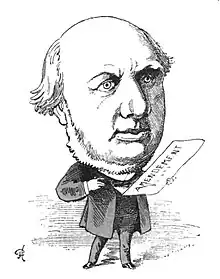Senator for life (France)
A senator for life (French: sénateur inamovible) was an honorary position in the French Third Republic, similar to that of senator for life in other countries. At one time the French Senate was composed of 300 members, of whom 75 were inamovible ("unremovable").

History
Under the law of 24 February 1875 on the organization of the Senate, there were 300 members of whom 225 were elected by the departments and colonies, and 75 were elected by the National Assembly. The 75 were elected by list and by an absolute majority of votes, and were irremovable, like the members of the Chamber of Peers under the Bourbon Restoration and the July Monarchy.
If a senator for life died or resigned, the Senate would elect a replacement within two months.[1] By the law of 10 December 1884 appointment of immovable senators ceased and the immovable senators gradually disappeared.[1] Émile Deshayes de Marcère, the last surviving sénateur inamovible, died in 1918.[1] Overall there were 116 lifetime senators.[2] The first 75 had been appointed by the National Assembly and the remaining 41 by the Senate itself.[1]
Notable immovable senators included Gaston Audiffret-Pasquier, first president of the Senate; the scientist Marcellin Berthelot, who became minister of public education and then minister of foreign affairs; Monseigneur Dupanloup; Jules Grévy, elected President of the Republic in 1879; Louis Martel, elected President of the Senate in 1879; Elie Le Royer, elected President of the Senate in 1882; Auguste Scheurer-Kestner, the defender of Alfred Dreyfus; the abolitionist Victor Schœlcher and the statesman Henri-Alexandre Wallon.[1]
In 2005, there was questioning about the status of former Presidents of the Republic. According to the constitution of the Fifth Republic, former presidents are de jure members of the Constitutional Council, which poses a problem of possible partiality. Some members of Parliament and commentators suggested that it should be replaced by a life membership in the Senate.[3][lower-alpha 1] This proposal was, however, not enacted.
List of life senators
The senators for life were:[2]
- Antoine Adam
- Édouard Allou
- Gaston Audiffret-Pasquier
- Louis d'Aurelle de Paladines
- Camille Bachasson de Montalivet
- Numa Baragnon
- Agénor Bardoux
- Ferdinand Barrot
- Jules Barthélemy-Saint-Hilaire
- Jean Didier Baze
- René Bérenger
- Alfred Bertauld
- Marcellin Berthelot
- Jean-Baptiste Billot
- Paul Broca
- Lucien Brun
- Louis Buffet
- Marc-Antoine Calmon
- Jean-Baptiste Campenon
- Joseph de Carayon Latour
- Hippolyte Carnot
- Auguste Casimir-Perier
- Jules Cazot
- François de Chabaud-Latour
- Bertrand de Chabron
- Paul de Chadois
- Nicolas Anne Théodule Changarnier
- Antoine Chanzy
- Joseph de Chareton
- Charles Chesnelong
- Jean-Jules Clamargeran
- Joseph d'Haussonville
- Anthime Corbon
- Alphonse Cordier
- Hyacinthe Corne
- Hippolyte de Cornulier-Lucinière
- Ernest Courtot de Cissey
- Adolphe Crémieux
- Ernest Denormandie
- Émile Deschanel
- Émile Deshayes de Marcère
- Henry Didier
- Charles Dietz-Monnin
- Guillaume-Ferdinand de Douhet
- Eugène Duclerc
- Jules Armand Dufaure
- Jean-Baptiste Dumon
- Félix Dupanloup
- Henri Dupuy de Lôme
- Jean-Joseph Farre
- Paul Foubert
- Émile Fourcand
- Martin Fourichon
- Charles Frébault
- Louis Gaulthier de Rumilly
- Eugène Goüin
- Théodore Grandperret
- Henri Greffulhe
- Henri François Xavier Gresley
- Albert Grévy
- Léonce Guilhaud de Lavergne
- Gustave Humbert
- Bernard Jauréguiberry
- Benjamin Jaurès
- Charles Kolb-Bernard
- Sébastien Krantz
- Léon Lalanne
- Pierre Lanfrey
- Roger de Larcy
- Jules de Lasteyrie du Saillant
- Léon Laurent-Pichat
- Édouard René de Laboulaye
- Oscar de La Fayette
- Victor Lefranc
- John Lemoinne
- Alphonse Lepetit
- Élie Le Royer
- Charles Letellier-Valazé
- Émile Littré
- Hippolyte de Lorgeril
- Victor Luro
- Jean Macé
- Pierre-Joseph Magnin
- Léon de Maleville
- Guillaume de Maleville
- Louis Martel
- Louis Raymond de Montaignac de Chauvance
- Paul Morin
- Jules Pajot
- Charles Paul Alexandre de Pasquier de Franclieu
- Eugène Pelletan
- Alexandre Peyron
- Ernest Picard
- Ernest Poictevin de La Rochette
- Louis Pierre Alexis Pothau
- Edmond de Pressensé
- Germain Rampont
- Charles Renouard
- Amable Ricard
- Édouard Roger du Nord
- Hervé de Saisy de Kérampuil
- Edmond Henri Adolphe Schérer
- Auguste Scheurer-Kestner
- Victor Schœlcher
- Jules Simon
- Achille Testelin
- Antoine Théry
- Pierre Tirard
- Hippolyte Clérel de Tocqueville
- Bernard-Louis Calouin de Tréville
- Louis Tribert
- Oscar de Vallée
- Étienne de Voisins-Lavernière
- Henri-Alexandre Wallon
- Louis Wolowski
- Charles Adolphe Wurtz
References
- See also the constitutional amendment proposals by senator Patrice Gélard.[4][5]
Sources
- Gélard, Patrice (15 February 2005), PROPOSITION DE LOI CONSTITUTIONNELLE relative aux anciens présidents de la République française (in French), retrieved 2018-01-14
- Gélard, Patrice; Leroy, Philippe; Goulet, Daniel; Lecerf, Jean-René; Yannick Texier, Gérard Longuet, Joël Billard, José Balarello, Charles Pasqua, Brigitte Bout, Michel Esneu, Paul Natali, Georges Ginoux, Joëlle Garriaud-Maylam, Louis Grillot, Paul Girod, Alain Fouché, Pierre André, Hugues Portelli, Bernard Saugey, Henri de Richemont, Louis Duvernois, Janine Rozier, René Beaumont, Michel Doublet, Louis Souvet and Jean Bizet.Gélard (27 January 2005), PROPOSITION DE LOI CONSTITUTIONNELLE relative au statut des anciens présidents de la République française, retrieved 2018-01-14
{{citation}}: CS1 maint: multiple names: authors list (link) - Hassoux, Didier (14 January 2005), "La Chiraquie veut protéger son chef quand il quittera l'Elysée", Libération (in French), retrieved 2018-01-14
- Les sénateurs inamovibles (in French), Senate of France, retrieved 2018-01-14
- Liste des anciens sénateurs de la IIIème République par circonscription : Inamovible (in French), Senat de France, retrieved 2018-01-13
Further reading
- Mayeur, Jean Marie; Corbin, Alain; Schweitz, Arlette (1995), Les immortels du Sénat, 1875-1918: les cent seize inamovibles de la Troisième République (in French), Publications de la Sorbonne, ISBN 978-2-85944-273-6